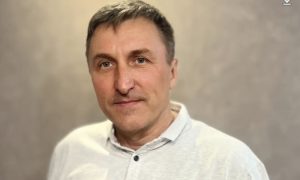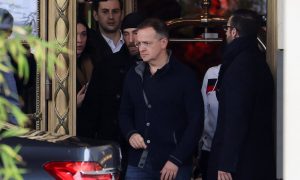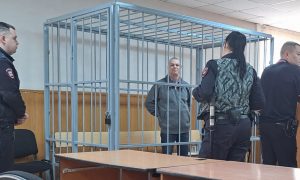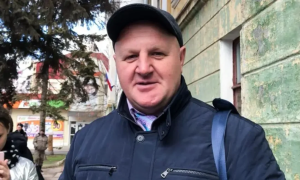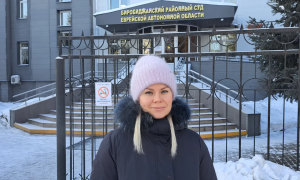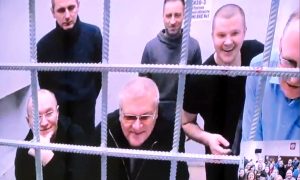| December 20, 2017Go to the bottom of this pageCollapse | |
|---|---|
| 14:00 | The hearings continue in the historic building, an architectural monument of federal significance. In it from 1835 to 1918 there was the Imperial College of Law, graduates of which left a notable mark in the history of Russia. In 2017, within the walls of this building is a trial that can become historical: for the first time in modern Russia, a book that influenced the development of civilization, the Bible, may be prohibited. |
| 14:10 | Listeners who came to the process are waiting at the entrance to the building from the side of Tchaikovsky Street – a famous composer who studied in the walls of this building and was one of the graduates of the School of Jurisprudence. |
| 2:30 pm |
Thick walls of the building make it difficult for Internet communication, because of which the report can be delayed. In the Ostankino Court of Moscow experts appeared in full force. They are accompanied by a group of men. In the corridors Lenoblsuda began hearing about 50 people, including representatives of the embassies of the United States, Britain and the Netherlands. The number of representatives of the prosecutor’s office increased in the ranks of advisers in justice and senior advisors in justice. |
| 14:50 | The hearings have not yet begun. Also to the hall in the Lenoblsud were diplomatic employees of Switzerland. |
| 15:20 |
The hearings have not yet begun. A slightly larger room was allocated, the court staff made two additional benches.Participants and listeners of the process are waiting in the corridor.
|
| 3:30 pm | The court secretary apologized for the delay and explained that it was connected with the establishment of a videoconference connection with Moscow. The process should begin soon. |
| 15:40 | The trial begins. In the Ostankino court there are two representatives of religious organizations, Alexander Dyubin and lawyer Anton Omelchenko. |
| 15:45 | All three experts came to court: Batov, Kotelnikov, Kryukova. In Lenoblsud the religious organization is represented by lawyer Anton Bogdanov and representative Maxim Novakov. The prosecutor’s office is represented by Justice Advisor Zhukov, and Senior Counselor of Justice Ganikhin. |
| 15:48 | Representative Novakov said that in the court of first instance, as an expert, an expert was admitted, the famous philologist Anatoly Baranov. He solicits his admission to participate in the survey of experts. The court is satisfied. |
| 15:50 | Anatoly Baranov enters the hall and takes a place among the participants in the process. The Moscow court has asked for admission to the courtroom of listeners. The court allows 16 listeners to enter (by the number of seats). |
| 15:53 | The Chamber of Judges consists of the presiding judge Larisa Gorbatova, the judge-rapporteur Tatyana Khruleva and the judge Igor Kosarev. |
| 15:55 | Lawyer Bogdanov declares the circumstances that became known after the decision of the court of first instance. It turns out that on the basis of an expert opinion carried out by these specialists, two Sergius Posadis, professing the religion of Jehovah’s Witnesses, were prosecuted. However, during the trial, the findings of the examination of Kryukova, Kotelnikov and Tarasov were refuted, and the Sergiev Posad people are justified. Bogdanov also cites other examples of expert opinions of these specialists against Jehovah’s Witnesses who are recognized as erroneous. This testifies to the lack of objectivity and impartiality of concrete experts to Jehovah’s Witnesses. |
| 4pm | As a result, the lawyer declares to experts that the challenge is not credible. As evidence of his words Bogdanov asks to attach materials to the case on 280 pages. |
| 16:05 | The court asks the opinion of representatives of the prosecutor’s office. They object to the challenge. Experts themselves, too, rising up, reject charges of bias. To resolve the issue, the court is removed to the advisory room. |
| 16:25 | For about 20 minutes the court is in the advisory room. It is noteworthy that the Leningrad-Finland transport prosecutor Alexander Ganikhin is involved in this process. |
| 4:30 pm | The court reads its definition. In the selection of experts refused. |
| 16:35 | Advocate Bogdanov solicits the removal of experts from the courtroom of two experts for the time being until the third one is questioned. The prosecutor’s office objects. |
| 16:38 | On the spot, the court decided to refuse the petition. |
| 16:45 | The judge of the Ostankino court Olesya Sushkova, having checked the appearance and warning about the criminal responsibility of the experts, is being removed. The meeting continues on a videoconference link under the chairmanship of the board of judges of the Leningrad Regional Court. |
| 16:47 | Presiding Judge Larisa Gorbatova finds out from Natalia Kryukova which books were sent to her for the study.Kryukova holds a Bible with the publishing name “Holy Scripture – Translation of a New World” in a gray cover. She claims she researched this book. |
| 4:50 pm | Judge Gorbatova is trying to find out why the text of the examination says that the subject of the study is a book with an English name. Lawyers ask the court not to prompt answers to the expert. |
| 16:53 | Expert Kryukova says that it was written by mistake. Judges continue to ask the expert, where did the English name come from? Kryukova says that Greek Scriptures in English means the Gospels. |
| 16:57 | Judge Gorbatova asks directly: is this edition a Bible. Expert Kryukova: “This publication is not a Bible in the traditional sense of Orthodox Christianity.” This edition, according to Kryukova, is a sacred text of the religion of Jehovah’s Witnesses. |
| 5pm | Expert Kryukova said that the legislator, adopting an amendment to the law, had in mind the Bible, which is respected in different religions: in Orthodoxy, Catholicism, Protestantism. |
| 17:02 | The court begins to interview the expert Kotelnikov. Judge Gorbatova asks: “Is not this a technical error?” Kotelnikov agrees. The judge proposes to open the Bible on the page before the Gospel of Matthew, where it is written that the translation of the Christian Greek Scriptures goes on. The judge asks whether this is an explanation of the fact that the examination uses the name “Greek Scriptures”. After long hesitation and after a hint, Kriukova answers that “this is the same thing.” And what is this book? “This is a very free translation of the Bible, let’s put it this way,” concludes expert Kotelnikov. |
| 17:10 | Expert Batov confidently declares that a technical error was made. He does not believe that this edition is the Bible. |
| 17:20 | Novakov’s representative asks the expert Kotelnikov where the technical error originated, namely, how the reference to the English book “Christian Greek Scriptures” appeared in the examination. Kotelnikov can not answer. Kryukov is called to explain. She says: “This is the cost of excess knowledge of English.” |
| 17:22 | The court removes a number of lawyers’ questions to understand why experts believe that “Holy Scripture” is not a Bible. Among other things, questions are removed: what is the original language of the Bible, how many books are the Bible. |
| 17:27 | Lawyer Omelchenko refers to the work of the fourth year student mentioned in the text of the examination, dedicated to the publication of the New World Translation of the Christian Greek Scriptures. Omelchenko shows this publication to the expert Kryukova and asks which of the two editions the student was examining. |
| 5:30 pm | Omelchenko’s lawyer refers to the questions posed to the experts, where the experts are asked to quote specific quotes from the publication. He asks why no one quotation from the “Holy Scripture” is included in the examination.Kryukova said that her conclusions about the extremist nature of the book “are based on the general orientation of the texts.” Omelchenko: “Do I understand correctly that you can not quote a single quote?” The court removes this question. |
| 17:35 | Omelchenko is trying to find out what methods are used by experts to come to the conclusion that this publication is not a Bible. Kryukova explains that the comparison of the text “Holy Scripture – Translation of the New World” with the text of the Synodal translation by experts was not carried out. |
| 17:40 | Questions are asked by the representative of Dyubin. On his question, the expert Kryukova explains that the Bible can not be considered a book if it is not marked “by the blessing of the patriarch” or if this book does not match word-for-word with such a translation. |
| 17:50 | Judge Gorbatova asks Kryukova, finally, to formulate what exactly she sees as extremism in the “Holy Scripture”?Kryukova responds that this is a legal matter and a court must answer it, and she, as an expert, has no right to answer this question by law. |
| 18:05 | Lawyer Bogdanov refers to a line from the expert conclusion, which says that “Holy Scripture” “is not an adequate translation.” Bogdanov asks what was the criterion of adequacy-inadequacy. Kryukov finds it difficult to answer, so the question is forwarded to expert Tarasov. Tarasov said that the translation would be adequate, which conveys the meaning “at the level of the whole text.” |
| 18:10 | In addition, Tarasov explains that the adequacy of the translation should be determined by the activity that the text generates. If the activity generated by the original corresponds to the activity generated by the translation, then the translation is adequate. |
| 18:15 | The court turns to Professor Baranov for help. He says there are many criteria, but the criterion, named by expert Tarasov, is unknown to him. |
| 18:22 | The court determines to finish the survey of experts. |
| 18:28 | Prosecutor Zhukov considers the decision of the court of first instance to be lawful and justified. Asks to deny the complaint. |
| 18:30 | Prosecutor Ganikhin briefly repeats the words of his colleague. |
| 18:31 | The court rejects the earlier application for reappointment (taking into account the explanations provided by the experts Kryukova, Tarasov, Kotelnikov). |
| 18:34 | Lawyer Bogdanov declares the petition to leave the claim of the prosecutor’s office without consideration due to the fact that the claim was signed and filed by an unauthorized person, since according to the law such a request can be submitted by the prosecutor no lower than the prosecutor’s office of the subject of the Russian Federation. |
| 18:37 | Lawyers wanted to ask relevant questions to the Leningrad-Finnish transport prosecutor. When sitting on the spot, the court refuses to satisfy the petition for leaving the claim without consideration. |
| 18:39 | Representative Novakov said the discontinuation of proceedings in the case of the brochure “The Bible and its main topic”, as in relation to this brochure there is already entered into force the decision of another court on the absence of signs of extremism in it. |
| 18:47 | A representative of the prosecutor’s office Zhukov said that the prosecutor’s office has no evidence that the court decision that came into force was issued on the same brochure. He recalls that in Russia there is no Anglo-Saxon system of law and there is no “precedent”. In this connection, he does not agree with the petition to stop the proceedings. |
| 18:50 | The court, when conferring on the spot, rejects the petition for termination of the proceedings in the part of the pamphlet. |
| 18:53 | Representatives of religious organizations declare a petition for the incorporation of new evidence that testifies to the bias of experts. Among them are the protocols of the notarial inspection of the Wikipedia site, from which the borrowings in the text of the examination are visible, and therefore the lack of autonomy of the experts’ conclusions. |
| 18:56 | The court shall satisfy the application for the attachment of the materials. |
| 19:00 | Referring to today’s oral explanation of the expert Kryukova about what the legislator meant by the Bible, accepting an amendment to protect the Bible from the anti-extremist legislation (Kryukova said that the legislator had in mind the Bible, which is respected in different religions: in Orthodoxy, Catholicism, Protestantism), a representative of Novakov declares a petition for sending to the Constitutional Court of the Russian Federation a judicial request for clarification of the concept of the Bible. The prosecutor’s office considers this petition as a drag on the trial. The court rejects this petition. |
| 19:05 | The court rejects the petition of the lawyer Bogdanov for the appointment of an additional examination, in connection with the fact that the experts did not quote a single quote from the “Holy Scripture” in support of their conclusions. |
| 19:07 | Lawyer Omelchenko declares a separate petition for the appointment of an additional examination to the Institute of Judaica and Bible Studies at St. Petersburg State University. Omelchenko solicits the question of asking the experts if the “Holy Scripture” is a translation of the critical scientific texts of the original sources of the Bible, namely the publication of the text of the original source of the Westcott and Hort Bible and the publication of the text of the original source of the Bible, called Hebraika Studgarten. The Institute of Judaica and Biblical Studies, judging from the data on its official website, is competent to perform the translation of the Bible. |
| 19:15 | The court rejects the petition. |
| 19:17 | The court begins to examine the case materials. Representative Novakov pays attention to available in the case of extracts from authoritative scientific catalogs in which “Holy Scripture – Translation of the New World” is included in the list of translations of the Bible. |
| 19:25 | The attention of the court is drawn to the extracts from the core scientific literature explaining the meaning of God’s name “Jehovah”, its position in the Bible and the history of its use in Bible translations. |
| 19:35 | The court reads scientific materials indicating that “Holy Scripture” occupies a legitimate place in a number of Bible translations. |
| 19:40 | Novakov’s representative solicits an examination of the material evidence in the case materials – a voluminous book with the text of the original source of the Bible, entitled “Biblia Hebraica Stuttgartensia”. The court announces a 2-minute break to bring this book to the courtroom. |
| 19:50 | Novakov draws attention to the table of contents of this book. Seeing that the book is mostly in Hebrew, Judge Gorbatov states that this is nothing more than a mockery of the court. Lawyer Omelchenko argues that the mockery can be called the very fact that lawyers are forced to prove the obvious things that the Bible is the Bible. In addition, previously unsuccessfully a petition was submitted for sending these materials to experts in Judaica and biblical studies who could compare and make sure that “Holy Scripture” is a translation of the Bible. |
| 8pm | The court rejects the request for a break until the next day, as the court has an irregular working day. Declares a 10-minute technical break. |
| 20:15 | The court session was continued. Novakov’s representative draws attention to the examinations carried out by authoritative scientists in the matter, as well as reviews of the expertise of Kryukova and her colleagues. There are serious methodological errors in the examination of Kryukova. |
| 20:40 | The court does not allow Representative Novakoff to finish the review of the materials of the case (for which the representatives have a procedural right). Representative Novakov asked to enter into the record an objection to the actions of the presiding judge. |
| 20:45 | Lawyer Omelchenko draws attention to a fragment in “Holy Scripture” (1 John 4: 7-10), in which readers are directly urged to show love for one’s neighbor. Omelchenko’s actions cause an acute reaction from the judiciary.Omelchenko explains that it is necessary to establish the falsity of accusations against this book in inciting hatred. |
| 20:47 | Omelchenko’s lawyer argues that the court’s challenge is dismissed with reference to prejudice. The court refuses to consider this challenge, arguing that the stage of allotments has passed. |
| 20:50 | Representatives state a petition for full disclosure in the courtroom of the full text of the “Holy Scripture.” This is necessary when deciding whether this book is extremist. The court rejects the petition. |
| 20:55 | The court passes to the stage of debate. The first advocate is Bogdanov. |
| 20:57 | Bogdanov draws attention to the fact that a subscription to criminal liability will not add competence to incompetent experts. Subscription is not also a “truth serum”, making the conclusions of the expert Kryukova known to be true.Bogdanov refers to the conclusions of the most authoritative scientists available in the matter. Bogdanov calls on the court to believe his eyes, and not to make a decision, fully trusting the compromised experts, Kryukova and her colleagues. Bogdanov asks to cancel the decision of the first instance and make a new decision, completely rejecting the demands of the prosecutor’s office. |
| 9pm | Speaker representative Novakov. He recalls that the court of first instance in its decision did not bother to quote any quotes that the court would consider extremist. Referring to today’s poll of the expert Kryukova and her colleagues, he recalls the grounds on the basis of which experts refuse to “Holy Scripture” in the right to be called the Bible.This is the use of the name “Jehovah”, and also that “Holy Scripture” does not proclaim the triune God. Novakov in his speech quotes a number of excerpts from the Church’s Synodal translation, which also disproves the triune God.“What, it is necessary to recognize as extremist and the Synodal translation?” Novakoff asks. |
| 21:10 | Novakov reminds that, according to current legislation, even open criticism of religious organizations and beliefs can not be considered extremism. Moreover, there is no reason to recognize the translation of the Bible as extremist. |
| 21:12 | As for the expertise of Kryukova, Novakov says, you, a respected court, should in this sense highlight it and press the “delete” button! Just throw it in the trash! So this examination is vicious. |
| 21:17 | Novakov reminds that experts today spoke about the “Orthodox Bible.” Such a Bible does not exist. The Bible is one for all. |
| 21:19 | Novakov draws attention to the fact that the experts worked for 287 days on their research, but did not even reach the second page of the “Holy Scripture” filled with the text, namely the Preface, where it is written in black and white that this book is the Bible. Experts say in their study that “Holy Scripture” does not even call itself the Bible, so it is not. |
| 21:23 | Novakov draws attention to the signs of discrimination. |
| 21:25 | What exactly is the legitimate aim pursued by the prosecutor’s office? What is he trying to achieve? That hundreds of thousands of Russian-speaking citizens who read this Bible burned it? Or, if they do not want to do this, so that they are subject to criminal prosecution? |
| 21:27 | Novakov reviews the international law and practice of the European Court of Human Rights. |
| 21:30 | In the debate, the representative of Dyubin. He says that “Holy Scripture” is the Bible and it’s silly to argue with it.He says that you do not need to be an expert so that, after scanning the “Holy Scripture”, you will be convinced that this is the Bible. The same stories, the same characters, the same sequence of presentation. |
| 21:32 | Dyubin says that even if we imagine such an absurd hypothetical situation, as if “Holy Scripture” is not the Bible, then why is there not a single “extremist” quote in the court’s decision? Where is at least one proof of the extremism of this book? How could the court of first instance recognize this book as extremist? |
| 21:37 | Referring to the legislation on the status of judges, he recalls that when making their decisions, judges should be guided by their conscience. This is a gift from God to man. Dyubin asks to cancel the decision of the court of first instance. |
| 21:38 | The speech in the debate begins with the lawyer Omelchenko. He draws attention to the fact that the court of first instance condemns believers to degrading treatment by taking away the “Holy Scripture” from them. Omelchenko focuses on the review of the European Convention on Human Rights. |
| 21:45 | Speech in the debate begins the representative of the prosecutor’s office Zhukov. He believes that everything said by his opponents is aimed at reassessing the conclusions of the court of first instance decision. In addition, Zhukov believes that representatives of stakeholders translate the dispute into the plane of religious disputes. He sees no reason to change the decision of the court of first instance. |
| 21:48 | The Leningrad-Finland transport prosecutor Ganikhin considers the decision of the Vyborg court lawful. He believes that the representatives of stakeholders had one goal – to involve the court and the parties in the theological dispute that there is a religion of God or the Bible. The legitimacy and validity of the examination he doubts does not cause.He asks to refuse to satisfy the appeal. |
| 21:51 | The court is removed to the advisory room to make a decision. |
| 21:55 | The court reads the decision: to leave the Vyborg court’s decision unchanged, the appellate complaint is not satisfied. |
- Friday
- February 27th, 2026
 Â
 